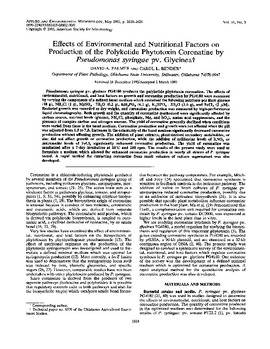| dc.contributor.author | Palmer, David A. | |
| dc.contributor.author | Bender, Carol L. | |
| dc.date.accessioned | 2018-08-17T16:24:48Z | |
| dc.date.available | 2018-08-17T16:24:48Z | |
| dc.date.issued | 1993-05 | |
| dc.identifier | oksd_davida.palmer_effectsofenviro_1993 | |
| dc.identifier.citation | Palmer, D. A., & Bender, C. L. (1993). Effects of environmental and nutritional factors on production of the polyketide phytotoxin coronatine by Pseudomonas syringae pv. glycinea. Applied and Environmental Microbiology, 59(5), 1619-1626. https://doi.org/10.1128/aem.59.5.1619-1626.1993 | |
| dc.identifier.uri | https://hdl.handle.net/11244/301431 | |
| dc.description.abstract | Pseudomonas syringae pv. glycinea PG4180 produces the polyketide phytotoxin coronatine. The effects of environmental, nutritional, and host factors on growth and coronatine production by PG4180 were examined by varying the components of a defined basal medium which contained the following nutrients per liter: glucose (10 g), NH4Cl (1 g), MgSO4 - 7H20 (0.2 g), KH2PO4 (4.1 g), K2HPO4 - 3H20 (3.6 g), and FeCl3 (2 uM). Bacterial growth was recorded as dry weight, and coronatine production was measured by high-performance liquid chromatography. Both growth and the quantity of coronatine synthesized were significantly affected by carbon source, nutrient levels (glucose, NH4Cl, phosphate, Mg, and SO4), amino acid supplements, and the presence of complex carbon and nitrogen sources. The yield of coronatine generally declined when conditions were varied from those in the basal medium. Coronatine production and growth were not affected when the pH was adjusted from 6.5 to 7.8. Increases in the osmolarity of the basal medium significantly decreased coronatine production without affecting growth. The addition of plant extracts, plant-derived secondary metabolites, or zinc did not affect growth or coronatine production, while the addition of millimolar levels of KNO3 or micromolar levels of FeCl3 significantly enhanced coronatine production. The yield of coronatine was maximized after a 7-day incubation at 18°C and 280 rpm. The results of the present study were used to formulate a medium which allowed for enhanced coronatine production in nearly all strains of P. syringae tested. A rapid method for extracting coronatine from small volumes of culture supernatant was also developed. | |
| dc.format | application/pdf | |
| dc.language | en_US | |
| dc.publisher | American Society for Microbiology | |
| dc.rights | This material has been previously published. In the Oklahoma State University Library's institutional repository this version is made available through the open access principles and the terms of agreement/consent between the author(s) and the publisher. The permission policy on the use, reproduction or distribution of the material falls under fair use for educational, scholarship, and research purposes. Contact Digital Resources and Discovery Services at lib-dls@okstate.edu or 405-744-9161 for further information. | |
| dc.title | Effects of environmental and nutritional factors on production of the polyketide phytotoxin coronatine by Pseudomonas syringae pv. glycinea | |
| osu.filename | oksd_davida.palmer_effectsofenviro_1993.pdf | |
| dc.description.peerreview | Peer reviewed | |
| dc.identifier.doi | 10.1128/aem.59.5.1619-1626.1993 | |
| dc.description.department | Plant Pathology | |
| dc.type.genre | Article | |
| dc.type.material | Text | |
| dc.subject.keywords | optimization | |
| dc.subject.keywords | ph | |
| dc.subject.keywords | regulation (control) | |
| dc.subject.keywords | microorganism culture | |
| dc.subject.keywords | culture medium | |
| dc.subject.keywords | phytotoxin | |
| dc.subject.keywords | pseudomonas syringae | |
| dc.subject.keywords | medium effect | |
| dc.subject.keywords | pseudomonadaceae | |
| dc.subject.keywords | pseudomonadales | |
| dc.subject.keywords | bacteria | |
